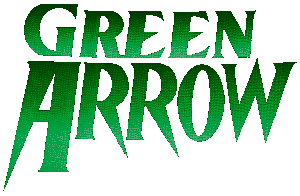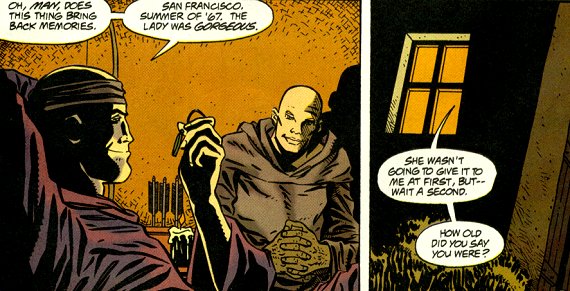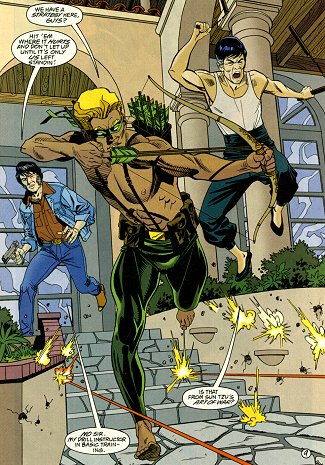
 Green Arrow
(DC)
Green Arrow
(DC)by Chuck Dixon/Kelley Puckett, Rodolfo DaMaggio/Jim Aparo, Robert Campanella/Gerry Fernandez
issues #0-109
Rating:
![]() What an odd way to number a series... It starts with #0, like the rest of the new titles
to come out after Zero Hour, but then jumps all the way to #91! Maybe it's an attempt
to pay homage to the original Flash series of the 50's which started at #105. Any
way, this is the story of Connor Hawke, or as he's better known: Green Arrow. It starts
with his origin and chronicles his early adventures.
What an odd way to number a series... It starts with #0, like the rest of the new titles
to come out after Zero Hour, but then jumps all the way to #91! Maybe it's an attempt
to pay homage to the original Flash series of the 50's which started at #105. Any
way, this is the story of Connor Hawke, or as he's better known: Green Arrow. It starts
with his origin and chronicles his early adventures.
![]() The first several issues focus on the appearance of Oliver Queen, a man who plays a pivotal
role in Green Arrow's decision to become a costumed hero. Oliver is a world-wise, experienced archer whom young Connor Hawke has idolised, because (as we - and Oliver - later learn) he's Oliver's illegitimate son. He has been through some good times and bad times... increasingly bad times. Now he's ready to quit, and returns to the Buddhist monastery where he once studied - and Connor now studies - archery. When he leaves, Connor goes with him, his adventure beginning.
The first several issues focus on the appearance of Oliver Queen, a man who plays a pivotal
role in Green Arrow's decision to become a costumed hero. Oliver is a world-wise, experienced archer whom young Connor Hawke has idolised, because (as we - and Oliver - later learn) he's Oliver's illegitimate son. He has been through some good times and bad times... increasingly bad times. Now he's ready to quit, and returns to the Buddhist monastery where he once studied - and Connor now studies - archery. When he leaves, Connor goes with him, his adventure beginning.

![]() I liked the use of this Oliver character as a vehicle to introduce the hero and provide the
impetus for him to begin his crime fighting career. It gives the reader a sense that
Green Arrow is joining the decade-long tradition of costumed heroics from DC, rather than
just being the star of this month's hot new series. It's too bad Oliver (predictably) had
to be killed off; he seems like an interesting character with a lot of potential. A series
focusing on the "earlier adventures" they allude to would be good reading, especially his
unlikely team-up with the nearly-omnipotent anti-hero Parallax (when Hal Jordan was - get
this - the original Green Lantern).
I liked the use of this Oliver character as a vehicle to introduce the hero and provide the
impetus for him to begin his crime fighting career. It gives the reader a sense that
Green Arrow is joining the decade-long tradition of costumed heroics from DC, rather than
just being the star of this month's hot new series. It's too bad Oliver (predictably) had
to be killed off; he seems like an interesting character with a lot of potential. A series
focusing on the "earlier adventures" they allude to would be good reading, especially his
unlikely team-up with the nearly-omnipotent anti-hero Parallax (when Hal Jordan was - get
this - the original Green Lantern).
![]() When Chuck Dixon took over the writing from Kelley Puckett early in the series, I was a bit
jarred by the sudden appearance in the dialog of gunsel, mook, wonk and
other words that I have never actually heard used in spoken English. In places, however
(e.g. Connor's conversation with his grandfather), the dialog rang very true. And
he treated Green Lantern (another new hero) with the appropriate respect: as a bit of a
butthead.
When Chuck Dixon took over the writing from Kelley Puckett early in the series, I was a bit
jarred by the sudden appearance in the dialog of gunsel, mook, wonk and
other words that I have never actually heard used in spoken English. In places, however
(e.g. Connor's conversation with his grandfather), the dialog rang very true. And
he treated Green Lantern (another new hero) with the appropriate respect: as a bit of a
butthead.
![]() Whatever else you think of his writing, Dixon tells an action-packed tale. Hardly an issue
of his went by without some guest star (e.g. Superman, Hal Jordan, Robin, Green Lantern,
Arsenal, Black Canary, Thorn, Bruce Lee, Elvis) and/or a fight (often guns vs. arrows).
While the action leading up to Oliver's death was exciting, the quick jumping from one
place to another (issue to issue) afterward seems a bit chaotic and directionless.
Green Arrow #101 was a melancholy reflection on a life lost heroically. But by
#102 it as if Oliver had been dead (and mostly forgotten) for months. As Superman (scripted
by Dixon himself) put it after Oliver's wake at Warrior's bar, "I'm told my own funeral
was... how should I put it? Well attended. This seems so sad in comparison. Only a few
friends in the back room of a bar." If Oliver were the icon they claim he was, I'd
expect a bit more reaction than fits in this single regular-size issue. I was also
disappointed with the little attention given to Moonday Hawke, Connor's mother, who has
appeared only briefly.
Whatever else you think of his writing, Dixon tells an action-packed tale. Hardly an issue
of his went by without some guest star (e.g. Superman, Hal Jordan, Robin, Green Lantern,
Arsenal, Black Canary, Thorn, Bruce Lee, Elvis) and/or a fight (often guns vs. arrows).
While the action leading up to Oliver's death was exciting, the quick jumping from one
place to another (issue to issue) afterward seems a bit chaotic and directionless.
Green Arrow #101 was a melancholy reflection on a life lost heroically. But by
#102 it as if Oliver had been dead (and mostly forgotten) for months. As Superman (scripted
by Dixon himself) put it after Oliver's wake at Warrior's bar, "I'm told my own funeral
was... how should I put it? Well attended. This seems so sad in comparison. Only a few
friends in the back room of a bar." If Oliver were the icon they claim he was, I'd
expect a bit more reaction than fits in this single regular-size issue. I was also
disappointed with the little attention given to Moonday Hawke, Connor's mother, who has
appeared only briefly.

![]() Newcomer Rodolfo DaMaggio's art is quite nice, and it's a shame that he's been lured to larger
pastures (drawing Batman). His rendition of Green Arrow has a beauty that makes the various
characters' comments about his sex appeal seem credible. This is important, because Green
Arrow's inheritance of "babe magnetism" from his father, contrasting with the innocence of a
young man who spent his adolescence in a monastery, is one of the especially unique traits
of this character.
Newcomer Rodolfo DaMaggio's art is quite nice, and it's a shame that he's been lured to larger
pastures (drawing Batman). His rendition of Green Arrow has a beauty that makes the various
characters' comments about his sex appeal seem credible. This is important, because Green
Arrow's inheritance of "babe magnetism" from his father, contrasting with the innocence of a
young man who spent his adolescence in a monastery, is one of the especially unique traits
of this character.
![]() One thing I like about Green Arrow is his attitude toward others. Due mostly to his innocence
and his religious training, he relates to women as people, not as potential sex partners.
And he treats his new male acquaintances as potential allies and friends, not rivals. I
hope they leave Connor's sex drive in low gear, and preserve this. I don't believe they'll
make him gay*, and I'd hate to see him lose this attitude by developing a libido and
following in his father's footsteps. For now, Green Arrow is "a hero for the 90's" in the
good sense of that phrase.
One thing I like about Green Arrow is his attitude toward others. Due mostly to his innocence
and his religious training, he relates to women as people, not as potential sex partners.
And he treats his new male acquaintances as potential allies and friends, not rivals. I
hope they leave Connor's sex drive in low gear, and preserve this. I don't believe they'll
make him gay*, and I'd hate to see him lose this attitude by developing a libido and
following in his father's footsteps. For now, Green Arrow is "a hero for the 90's" in the
good sense of that phrase.
![]() *I think it would present some wonderful story possibilities, however. How would Connor
respond to a growing awareness that he really isn't attracted to women? How would the
"open-minded" but immature Kyle Rayner react if he learned that his tights-wearing-buddy
Connor was gay? Would it enhance their "odd couple" partnership? Would Connor be vulnerable
to blackmail if a Bad Guy found out he was gay? And if Oliver ever does reappear, how
would the liberal-but-womanizing old rogue deal with the knowledge that he'd sired a
homosexual?
*I think it would present some wonderful story possibilities, however. How would Connor
respond to a growing awareness that he really isn't attracted to women? How would the
"open-minded" but immature Kyle Rayner react if he learned that his tights-wearing-buddy
Connor was gay? Would it enhance their "odd couple" partnership? Would Connor be vulnerable
to blackmail if a Bad Guy found out he was gay? And if Oliver ever does reappear, how
would the liberal-but-womanizing old rogue deal with the knowledge that he'd sired a
homosexual?
![]() DC has introduced a platoon of new characters in recent years, through lame plot devices
(Bloodlines), as "replacements" for established heroes (Superboy, Steel, Azrael, Artemis),
in the course of regular stories (Alpha Centurion, Impulse), or just by launching a new
series (Aztek, Teen Titans, Sovereign Seven). Green Arrow stands out as one of the better
of them. Without super powers (just a knack with the bow and arrow, and some years of
martial arts training) Connor exemplifies what a hero should be: a good person, doing good,
for good reasons.
DC has introduced a platoon of new characters in recent years, through lame plot devices
(Bloodlines), as "replacements" for established heroes (Superboy, Steel, Azrael, Artemis),
in the course of regular stories (Alpha Centurion, Impulse), or just by launching a new
series (Aztek, Teen Titans, Sovereign Seven). Green Arrow stands out as one of the better
of them. Without super powers (just a knack with the bow and arrow, and some years of
martial arts training) Connor exemplifies what a hero should be: a good person, doing good,
for good reasons.
![]()
© Todd VerBeek, Radio ZeroTM